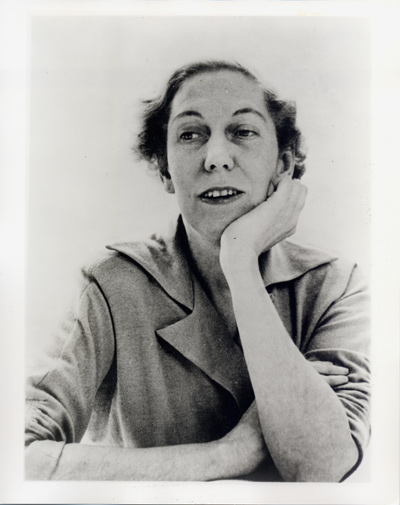Biography
Eudora Alice Welty (April 13, 1909 – July 23, 2001) was an American short story writer, novelist and photographer who wrote about the American South. Her novel The Optimist's Daughter won the Pulitzer Prize in 1973. Welty received numerous awards, including the Presidential Medal of Freedom and the Order of the South. She was the first living author to have her works published by the Library of America. Her house in Jackson, Mississippi has been designated as a National Historic Landmark and is open to the public as a house museum. Eudora Welty was born in Jackson, Mississippi, on April 13, 1909, the daughter of Christian Webb Welty (1879–1931) and Mary Chestina (Andrews) Welty (1883–1966). She grew up with younger brothers Edward Jefferson and Walter Andrews. Her mother was a schoolteacher. Her family were members of the Methodist church. Her childhood home remains and was listed on the National Register of Historic Places prior to a dormer and deck being added to the roof.Welty soon developed a love of reading reinforced by her mother, who believed that "any room in our house, at any time in the day, was there to read in, or to be read to." Her father, who worked as an insurance executive, was intrigued by gadgets and machines and inspired in Welty a love of mechanical things. She later used technology for symbolism in her stories and also became an avid photographer, like her father.She attended Central High School in Jackson. Near the time of her high school graduation, Welty moved with her family to a house built for them at 1119 Pinehurst Street, which remained her permanent address until her death. Wyatt C. Hedrick designed the Weltys' Tudor Revival-style home, which is now known as the Eudora Welty House and Garden.
Welty studied at the Mississippi State College for Women from 1925 to 1927, then transferred to the University of Wisconsin to complete her studies in English literature. At the suggestion of her father, she studied advertising at Columbia University. Because she graduated in the depths of the Great Depression, she struggled to find work in New York.
Soon after Welty returned to Jackson in 1931, her father died of leukemia. She took a job at a local radio station and wrote as a correspondent about Jackson society for the Memphis newspaper The Commercial Appeal. In 1933, she began work for the Works Progress Administration. As a publicity agent, she collected stories, conducted interviews, and took photographs of daily life in Mississippi. She gained a wider view of Southern life and the human relationships that she drew from for her short stories. During this time she also held meetings in her house with fellow writers and friends, a group she called the Night-Blooming Cereus Club. Three years later, she left her job to become a full-time writer.In 1936, she published "The Death of a Traveling Salesman" in the literary magazine Manuscript, and soon published stories in several other notable publications including The Sewanee Review and The New Yorker. She strengthened her place as an influential Southern writer when she published her first book of short stories, A Curtain of Green. Her new-found success won her a seat on the staff of The New York Times Book Review, as well as a Guggenheim Fellowship which enabled her to travel to France, England, Ireland, and Germany. While abroad, she spent some time as a resident lecturer at the universities of Oxford and Cambridge, becoming the first woman to be permitted into the hall of Peterhouse College. In 1960, she returned home to Jackson to care for her elderly mother and two brothers.After Medgar Evers, field secretary of the NAACP in Mississippi, was assassinated, she published a story in The New Yorker, "Where Is the Voice Coming From?". She wrote it in the first person as the assassin.
In 1971, she published a collection of her photographs depicting the Great Depression, titled One Time, One Place. Two years later, she received the Pulitzer Prize for Fiction for her novel The Optimist's Daughter. She lectured at Harvard University, and eventually adapted her talks as a three-part memoir titled One Writer's Beginnings. She continued to live in her family house in Jackson until her death from natural causes on July 23, 2001. She is buried in Greenwood Cemetery in Jackson. Her headstone has a quote from The Optimist's Daughter: "For her life, any life, she had to believe, was nothing but the continuity of its love."Throughout the 1970s, Welty carried on a lengthy correspondence with novelist Ross Macdonald, creator of the Lew Archer series of detective novels.
Filmography
Ratings
Information
Known ForWriting
GenderFemale
Birthday1909-04-13
Deathday2001-07-23 (92 years old)
Birth PlaceJackson, Mississippi, United States of America
CitizenshipsUnited States of America
ResidencesMississippi · Jackson, United States of America
Awardshonorary doctor of Brandeis University, Charles Frankel Prize, Fellow of the American Academy of Arts and Sciences, National Medal of Arts, Guggenheim Fellowship, PEN/Malamud Award, Pulitzer Prize for Fiction, O. Henry Award, Presidential Medal of Freedom, Helmerich Award, Lillian Smith Book Award, St. Louis Literary Award, America Award in Literature, National Women's Hall of Fame, Rea Award for the Short Story, William Dean Howells Medal of the American Academy of Arts and Letters, National Book Award for Fiction, Common Wealth Award of Distinguished Service
This article uses material from Wikipedia.
 Eudora Welty
Eudora Welty- Filmography
- Information





